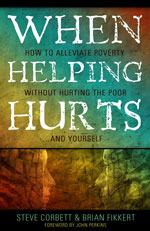15 Feb Book: “When Helping Hurts”
 In my opinion, “When Helping Hurts” is the single best book I’ve read on the topic of working with the poor. Not only should every Christian worker read it; every Christian ought to read it whether or not they work directly with the poor.
In my opinion, “When Helping Hurts” is the single best book I’ve read on the topic of working with the poor. Not only should every Christian worker read it; every Christian ought to read it whether or not they work directly with the poor.
The authors of the book, Steve Corbett and Brian Fikkert, are community development specialists with the Chalmers Center for Economic Development and professors at Covenant College. Striking to me were the misperceptions we often have regarding the true needs of the poor. Summarizing the results of a polls, they comment:
Poor people typically talk in terms of shame, inferiority, powerlessness, humiliation, fear, hopelessness, depression, social isolation, and voicelessness. North American audiences (or the wealthy) tend to emphasize a lack of material things such as food, money, clean water, medicine, housing, etc.
The result of such misconceptions is that we seek only to bring relief or aid, when what is ultimately needed is rehabilitation and restoration in relationship with God and others. They write that there are three reasons we do this:
- Many service organizations have a material definition of poverty; hence they believe that handouts of material things are the solution to that poverty.
- Relief is easier to do than development. It is much simpler to drop food out of airplanes or to ladle soup out of bowls than it is to develop long-lasting, time-consuming relationships with poor people, which may be emotionally exhausting.
- It is easier to get donor money for relief than for development. “We fed a thousand people today” sounds better than, “We hung out and developed relationships with a dozen people today.”
Key to their approach to relief and development is assessing local assets. Too often we ask, “What do they need?” and fail to ask the even more important question, “What do they have?” They point attention to Colossians 1:16-17, where we’re told the Christ is holding all things together and that he does not allow the effects of sin to completely destroy the inherent goodness of the assets he has created. In Christ, God is reconciling to himself all things–natural resources, individuals, neighborhood associations, schools, businesses, governments, etc. All are being liberated from their “bondage to decay” (Romans 8:12).
The process of assessment involves appreciating, envisioning, co-constructing and sustaining, and can only be done together. We need to move from “doing for” to “doing with” so that eventually they will be able to do it for themselves and even assist others in the same way they have been helped.
Finally, they wrap up the book with a chapter entitled, “Doing Short-term Missions Without Doing Long-Term Harm.” This is a Must Read for anyone going on a short-term trip. The key here is quite simple: don’t do for people what they can, or should, do for themselves. The goal is for the work to be done primarily by the community members with the team in a helping role. Stay away from the “go-help-and save-them” and maintain a “go-as-a-learner” attitude.

No Comments